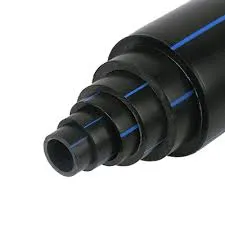nóv . 15, 2024 01:36 Back to list
hdpe irrigation pipe
The Benefits of HDPE Irrigation Pipes
High-Density Polyethylene (HDPE) irrigation pipes have become increasingly popular in modern agricultural practices due to their numerous advantages over traditional irrigation methods. These pipes are made from a thermoplastic polymer known for its strength, flexibility, and durability, making them an ideal choice for various irrigation applications.
The Benefits of HDPE Irrigation Pipes
Another significant advantage of HDPE pipes is their lightweight nature, which facilitates easy handling and installation. Traditional irrigation systems can often be cumbersome and require heavy equipment for installation. In contrast, HDPE pipes can be transported and installed with minimal effort, reducing labor costs and time associated with setup. This allows farmers to quickly deploy their irrigation systems and respond to their crops' water needs more adequately.
hdpe irrigation pipe

Furthermore, HDPE pipes are highly flexible, enabling them to be installed in various configurations to suit different field layouts. This flexibility is particularly beneficial in uneven terrain or areas where traditional rigid pipes may struggle. Additionally, HDPE pipes can be fused together to create a seamless, leak-proof irrigation system, further enhancing their efficiency and reducing water loss during transportation.
The environmental impact of HDPE irrigation pipes is also noteworthy. These pipes promote efficient water management practices, allowing farmers to optimize their irrigation schedules and reduce water wastage. By using HDPE pipes, farmers can implement precision irrigation techniques, ensuring that crops receive adequate moisture without overwatering. This not only conserves water resources but also minimizes the risk of soil erosion and nutrient leaching, contributing to sustainable farming practices.
Moreover, HDPE pipes are recyclable, which aligns with the growing demand for environmentally friendly materials in agricultural applications. Once they reach the end of their life cycle, these pipes can be repurposed, reducing plastic waste in landfills and promoting a circular economy.
In conclusion, HDPE irrigation pipes offer numerous advantages that make them a superior choice for modern agricultural practices. Their durability, flexibility, lightweight design, and environmental benefits make them an essential component of effective irrigation systems. By adopting HDPE pipes, farmers can enhance their productivity, reduce costs, and contribute to more sustainable agricultural practices, ultimately leading to healthier crops and improved food security.
-
High-Quality HDPE Sheet | Durable Plastic Panels
NewsAug.06,2025
-
High-Precision PVC Rigid Sheets for Vacuum Forming | AI-Optimized
NewsAug.05,2025
-
Durable PVC-M Water Supply Pipes | 60-Year Life
NewsAug.04,2025
-
Premium HDPE Water Supply Pipes: Durable & Leak-Proof
NewsAug.03,2025
-
Premium PVC-M Water Supply Pipe - Durable & Efficient
NewsAug.02,2025
-
HDPE Drainage & Irrigation Pipe - Durable, Efficient Solutions
NewsAug.01,2025

